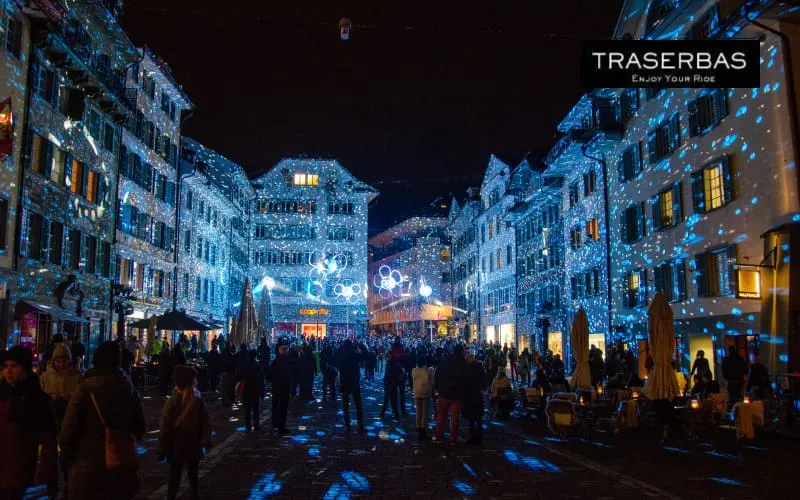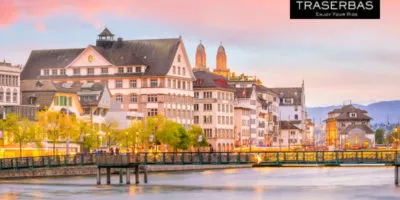Deks

This is a wonderful country nestled in the heart of Europe. There is a rich tapestry of traditions and customs of Switzerland. This is deeply rooted in its history and diverse cultural heritage. The Swiss are famous for preserving age-old practices while embracing modernity. The country’s customs and traditions reflect a unique blend of influences. They are owing to its multilingual and multicultural society. One of Switzerland’s enduring customs is its vibrant festival calendar. This includes events like Fasnacht and cow parades.
The country’s deep appreciation for nature is evident in its dedication to sustainable practices. Also, there are outdoor traditions like hiking and skiing. Switzerland’s commitment to neutrality and political stability. It is also an integral part of its national identity. We explore the captivating world of traditions and customs of Switzerland. They offer a glimpse into the unique and multifaceted culture of this European nation. You can pick up all national traditions and customs in the must-visit Swiss cities with Traserbas.
They are a fascinating reflection of its cultural diversity. The country’s multilingual population contributes to a mosaic of customs. Also, several key traditions stand out:
The country’s unique blend of customs and traditions underscores its multicultural identity. This makes it a captivating and culturally rich nation. If you want to visit this country, contact us. We are the most reliable car service in Switzerland.
Switzerland’s culture and traditions are a testament to the country’s unique position. This is at the crossroads of Europe, where German, French, Italian, and Roman cultures converge. Swiss culture is deeply influenced by its commitment to diversity. Also, neutrality and the preservation of rich customs. There are 4 official languages in Switzerland. They showcase their multicultural character with each linguistic region. This is contributing to the nation’s customs and traditions. Switzerland celebrates a range of vibrant festivals.
For example, Fasnacht, where masked processions and colorful parades mark the pre-Lenten season. The cow parades in the Alps are another cherished tradition. Switzerland’s breathtaking landscapes inspire a love for outdoor activities. From hiking to skiing, reflecting a deep connection to nature. Its tradition of political neutrality and diplomacy plays a significant role in its culture. Also, it fosters peace and international cooperation. The traditions of Switzerland reflect a commitment to unity, diversity, and global harmony.
It is a land of diverse festivals and celebrations that reflect its rich cultural heritage and regional diversity. Here are some notable Swiss festivals:
Such festivals offer a glimpse into the vibrant and diverse cultural landscape of Switzerland, celebrating its history, art, music, regional traditions, and the unique traditions and customs of Switzerland.
The culinary tradition of Switzerland is a delightful fusion of flavors. Swiss culinary delights are a yummy reflection of the country’s rich cultural diversity. Also, a love for high-quality ingredients. Switzerland is famous not only for its cheese and chocolate. Its culinary repertoire extends far beyond these iconic offerings. Here are some delectable culinary delights:
National culinary delights not only showcase. The country’s culinary expertise also offers a delightful taste of its cultural diversity. The commitment to quality and sourced ingredients makes Swiss cuisine a delight for all food enthusiasts.
Switzerland’s cultural customs have roots in history and regional influences. making Switzerland a captivating blend of old-world charm and modernity. The precision craftsmanship that the Swiss are famous for extends. Beyond watchmaking to encompass other fields. For example, fine jewelry and high-end precision instruments.
Switzerland’s commitment to neutrality and diplomacy on the international stage. Further underscores its customs and the country’s deep appreciation for the great outdoors. It reflects in its love for hiking, skiing, and other outdoor traditions.
The music and dance traditions of Switzerland are as diverse as its multicultural society. They offer a vibrant tapestry of cultural expressions. With influences from its four linguistic regions. Each linguistic region of Switzerland has its folk music traditions. They are reflecting the cultural diversity. Swiss folk music is a vibrant mosaic. In the German-speaking regions are the lively accordion-driven tunes. The melodic Alpine melodies meet in the French-speaking areas.
Switzerland’s reputation for precision and craftsmanship is a source of global admiration. The Swiss are famous for their meticulous attention to detail. Also, for commitment to producing high-quality goods across various industries. Here, we explore two emblematic facets of Swiss precision and craftsmanship:
Swiss precision and craftsmanship set a benchmark for excellence. It also serves as a testament to the nation’s dedication to quality and innovation across various sectors.
Traditions and customs of Switzerland are a testament to its ability to embrace both its rich heritage and the modern world. This makes it a nation that cherishes its traditions while thriving in a globalized era. National festivals and cuisine will not leave anyone indifferent. We can meet you at the airport and create an unforgettable tourist program.
In Basel, Switzerland, you can savor authentic Swiss cuisine at various restaurants. Some popular options include Restaurant Schifferhaus for traditional dishes like schnitzel. Also, Zum Kuss for fondue and raclette. Additionally, exploring the city’s cafes and bakeries for Swiss pastries and chocolate is a must for a culinary adventure.
Fasnacht, Basel’s renowned Carnival, Swiss people celebrate in the city in late winter or early spring. It is in February or March. Fasnacht is a vibrant and lively festival marked by colorful parades. Also, masked processions and enthusiastic street celebrations. This makes it one of the most significant events on Basel’s cultural calendar.
You can buy Swiss chocolates for souvenirs throughout the year in Switzerland. National chocolatiers offer a wide variety of chocolates. Also, many shops and boutiques in Zurich, Geneva, and Lucerne sell these delectable treats. They’re available for tourists and chocolate enthusiasts at any time.

What is Switzerland Famous For
Nestled in the European core, the Swiss Confederation is a land of timeless charm and global renown. It is always celebrated for many distinct attributes. They have shaped its international reputation. The country is famous as the epitome of precision and craftsmanship. Switzerland is synonymous with its watchmaking heritage. It produces some of the world’s […]

Exploring the Most Picturesque Places in Switzerland
Nestled in the bosom of Europe, the Swiss Confederation beckons travelers. They are always attracted by its faery views and unprecedented natural glory. The country is famous for its grand Alps, pristine lakes, and charming hamlets. This alpine wonderland is a haven for those seeking a visual feast for the senses. Join us on a […]

Exploring Where to Stay in Zurich
In the Swiss Confederation, there are a lot of fascinating cities. One of them is Zurich. Here, rich history, cultural vibrancy, and modern sophistication converge. You start your journey to this Swiss metropolis. So, where to stay becomes pivotal in shaping your experience. Such a city offers a diverse array of neighborhoods. Each has its […]